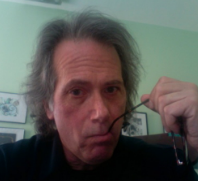
Caitlin Jenner might love this book. You might not.
But then again–you might! “Woman,” by Veemala Victoria Persaud (AuthorHouse, 2018, 153 pages) is one of those books where the subject matter (in this case, gender reassignment, or transgender change) can get inextricably bound up in a reader’s estimation of the actual quality of the writing, of the author’s skill in getting their message across. Two examples among many come to mind: “The Autobiography of Malcolm X,” or “The Way I Am” (the autobiography of the rapper Eminem) might be superb reads…but certain readers will object to the subject matter, and in so doing will consider the book a waste.
“Woman” is the true story of a boy who grew up (and threw up, many times!) in the Central American country of Guyana, where his abiding feeling that he was really a girl was poorly tolerated (to say the least) by his family and most of the other people in his village. He was hated, humiliated, burdened with chores, even sodomized against his will by a gang of cruel, sadistic teenage boys.
After a great deal of suffering, and strategizing, Veemala makes it to the United States, where she succeeds in making the transition from boy to girl with the help of therapists and surgeons. And there is a happy ending. Veemala is happy, first as a beautician, then as a surgical technician and a motivational speaker. Not only that, but she emerges from the process as a very good-looking woman. By her account, men of good standing (doctors, lawyers) line up at her door, begging for a date.
I’ve made my point. Most readers will feel pity for the boy – pity and disgust at the intolerance and unforgivably violence he is forced to undergo. Then there are undoubtedly those who will be disgusted not so much by young Veemala’s plight as by the very idea of wanting to ‘make the transition’ from one sex to the other. Veemala’s story makes me proud to be an American. Why? Because she was able to get to this country and eventually establish citizenship on the basis of political intolerance. (I’m sure there are others who wish we could build a wall separating Guyana from the U.S. But the geography doesn’t work that way!)
Is the desire to morph genders an inborn one, with some hormonal or brain basis, that justifies the complex intervention of gender reassignment surgery? Or is it a symptom of a mental or personality disorder? There are vociferous advocates of each point of view. The procedure is too new to perform credible longitudinal studies of the well-being and outcome of those who have undergone it.
In the meantime, candidates for the surgery must be carefully evaluated by psychologists or psychiatrists to make sure, to the extent possible, that the feeling that one has been born into the wrong sex is not pathological, or the result of a psychiatric disorder. What we do know is that several decades ago, homosexuality was widely considered to be an emotional illness and was diagnosed as such.
Yet with the passage of time and skillful clinical observation, it became clear that most individuals who are gay have felt that way since infancy. One could argue that there are many disease states that are inborn–and the debate goes on and on. It is entirely possible that doctors who participated in gender reassignment will become the target of very expensive malpractice (or manslaughter!) litigation.
The book is a quick and smooth read. It is written in a voice that absolutely reflects some of the horrors undergone by the author. It is supplemented with a comprehensive section of resources for ‘LGBT’ readers and the author has also included some (nearly provocative) photos of Veemala as she appears now.
Interested individuals can also tune in to a series of YouTube videos starring Veemala that she has produced to amplify her both her story and the spiritual ideas from which her personal transformation proceeds.

You must be logged in to post a comment Login